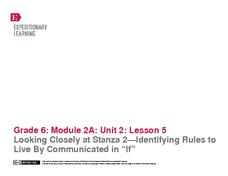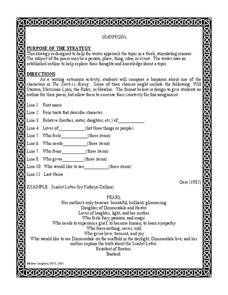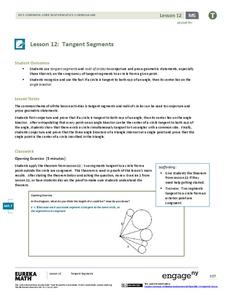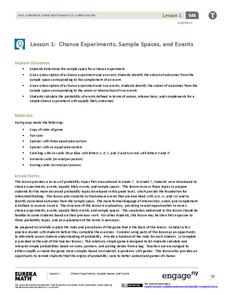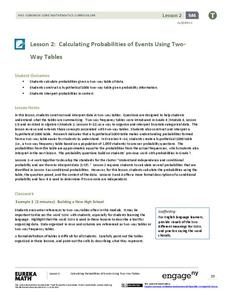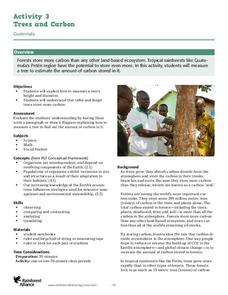EngageNY
Looking Closely at Stanza 2—Identifying Rules to Live By Communicated in “If”
Pupils take part in a close reading of the poem, If by Rudyard Kipling, in which they delve deep into its meaning and identify its rules to live by. As the grand discussion progresses, learners then relate the poem's rules with those...
KOG Ranger Program
Match and Lighter Safety
Go over the basics of fire prevention with a lesson focused on safety with matches and lighters. With a series of dilemma cards that describe potential fire risks, learners choose the most responsible way to handle matches and...
Curated OER
Sentence Structure: Sentence Types
Sixth graders identify parts that make up different types of sentences with a grammar presentation. The last few slides prompt learners to complete 10 exercises in which they indicate whether each sentence is simple, compound,...
Curated OER
Paper Dragon Fairy Tale
Imagine a beautiful rainbow-colored dragon flying free in the air. With powerful imagery and sensory language, a reading passage prompts learners to follow the plot of a short story and answer five comprehension questions.
KOG Ranger Program
Matches, Lighters, and Kids Do Not Go Together!
Do your part to prevent forest fires with an activity about not playing with matches. A word search prompts young rangers to fill in the blanks about the consequences of playing with matches, and a set of pictures provides spaces for...
Curated OER
The Metamorphosis: Concept/Vocabulary Analysis
Historically, Franz Kafka's The Metamorphosis has been difficult for many readers to grasp. From the difficult translation issues to the complex plot and themes, the novel's message and story can be lost when learners...
Novelinks
The Dark Is Rising: Biopoem
How well do your learners really know the characters in Susan Cooper's The Dark is Rising? A biopoem activity prompts readers to investigate the characters and their traits. Line by line, writers add the characters'...
National Wildlife Federation
What's Your Habitat?
How are third graders like rabbits? They both live in habitats and require food, water, and shelter to survive! An educational science lesson encourages your learners to think about their own habitats and survival needs, before comparing...
Syracuse City School District
Greek and Latin Roots, Prefixes, and Suffixes
How can adding a prefix or suffix to a root word create an entirely new word? Study a packet of resources that focuses on Greek and Latin roots, as well as different prefixes and suffixes that learners can use for easy reference.
Massachusetts Institute of Technology
Lego Atoms and Molecules: Chemical Reactions
Show young chemists what a chemical reaction looks like with two parts of a hands-on experiment. First, learners conduct a wet lab where they observe the reactants (baking soda and calcium chloride, with phenolsulfonphthalein)...
It's About Time
The Electricity and Magnetism Connection
Magnets don't grow in fields, but magnetic fields are important to understand. The lesson covers the effect electricity has on magnetic fields. Scholars use a compass, magnets, and electrical wire to test magnetic fields and energy...
Virginia Department of Education
Determining Absolute Age
How can radioactive decay help date old objects? Learners explore half-life and radioactive decay by conducting an experiment using pennies to represent atoms. Young scientists graph data from the experiment to identify radioactive decay...
EngageNY
The Angle Measure of an Arc
How do you find the measure of an arc? Learners first review relationships between central and inscribed angles. They then investigate the relationship between these angles and their intercepted arcs to extend the Inscribed Angle Theorem...
EngageNY
Tangent Segments
What's so special about tangents? Learners first explore how if a circle is tangent to both rays of an angle, then its center is on the angle bisector. They then complete a set of exercises designed to explore further properties and...
EngageNY
Successive Differences in Polynomials
Don't give your classes the third degree when working with polynomials! Teach them to recognize the successive differences and identify the degree of the polynomial. The activity leads learners through a process to develop an...
Willow Tree
Formulas
Help learners understand the benefits of rearranging a formula. Scholars practice rearranging formulas for specific variables. They also analyze formulas to understand one variable's effect on the other.
EngageNY
Modeling Riverbeds with Polynomials (part 2)
Examine the power of technology while modeling with polynomial functions. Using the website wolfram alpha, learners develop a polynomial function to model the shape of a riverbed. Ultimately, they determine the flow rate through the river.
EngageNY
Systems of Equations
What do you get when you cross a circle and a line? One, two, or maybe no solutions! Teach learners to find solutions of quadratic and linear systems. Connect the visual representation of the graph to the abstract algebraic methods.
EngageNY
Graphing the Sine and Cosine Functions
Doing is more effective than watching. Learners use spaghetti to discover the relationship between the unit circle and the graph of the sine and cosine functions. As they measure lengths on the unit circle and transfer them to a...
EngageNY
Basic Trigonometric Identities from Graphs
Have young mathematicians create new identities! They explore the even/odd, cofunction, and periodicity identities through an analysis of tables and graph. Next, learners discover the relationships while strengthening their...
EngageNY
Chance Experiments, Sample Spaces, and Events
Want a leg up on the competition? Show classes how to use mathematics to their advantage when playing games. Learners calculate probabilities to determine a reasonable scoring strategy for a game.
EngageNY
Calculating Probabilities of Events Using Two-Way Tables
Tables are useful for more than just eating. Learners use tables to organize data and calculate probabilities and conditional probabilities.
EngageNY
Ruling Out Chance (part 2)
Help your classes find the significance in this lesson! Learners analyze the probability of Diff values. They then determine if the difference is significant based on their probability of occurrence.
Rainforest Alliance
Trees and Carbon
You'll find everything but the kitchen sink here ... or just a carbon sink. In the activity, pairs or groups of middle school learners go outside and measure a tree's circumference and height to estimate its carbon storage potential and...
Other popular searches
- Diverse Learners
- Kinesthetic Learner
- English Language Learners
- Adult Learners
- Kinesthetic Learner Math
- Literacy Kinesthetic Learner
- Diversity of Learners
- Second Language Learners
- English Learners
- Learner Log
- Lessons for Diverse Learners
- Community of Learners
